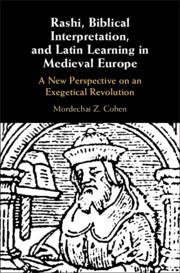 Rashi, Biblical Interpretation, and Latin Learning in Medieval Europe
Rashi, Biblical Interpretation, and Latin Learning in Medieval Europe Published online by Cambridge University Press: 15 April 2021
Within a mere two generations – from Rashi to Joseph Qara to Rashbam – the rules of Ashkenazic Bible interpretation were rewritten in northern France, as outlined in the preceding chapter. No longer was the Bible viewed exclusively as a divine cryptic document, to be decoded through the tools of midrashic inquiry. The peshat project entailed analyzing the Bible as an open book like others, its meaning to be understood through contextual-philological analysis. Rather than mining the sacred text for moral and halakhic “instruction,” the pashtanim aimed to understand the ancient Scripture within its human historical context in the Near East of biblical times. It is thus not surprising that this movement has been viewed as a precursor of modern historical-critical Bible scholarship. But the twelfth-century pashtanim were not modern Bible scholars. It is necessary to consider how they perceived this new interpretive model within their cultural-intellectual framework and to ask: what was the status of this peshat method – in their view – vis-à-vis the traditional midrashic mode of reading Scripture? As we shall demonstrate in this chapter, a new appreciation of the Bible’s literary nature – which finds illuminating parallels in Latin learning – was essential for negotiating the narrow straits between the traditional midrashic outlook and the powerful peshat methodology that emerged in the circle of Joseph Qara, Rashbam, and their students in twelfth-century northern France.
To save this book to your Kindle, first ensure [email protected] is added to your Approved Personal Document E-mail List under your Personal Document Settings on the Manage Your Content and Devices page of your Amazon account. Then enter the ‘name’ part of your Kindle email address below. Find out more about saving to your Kindle.
Note you can select to save to either the @free.kindle.com or @kindle.com variations. ‘@free.kindle.com’ emails are free but can only be saved to your device when it is connected to wi-fi. ‘@kindle.com’ emails can be delivered even when you are not connected to wi-fi, but note that service fees apply.
Find out more about the Kindle Personal Document Service.
To save content items to your account, please confirm that you agree to abide by our usage policies. If this is the first time you use this feature, you will be asked to authorise Cambridge Core to connect with your account. Find out more about saving content to Dropbox.
To save content items to your account, please confirm that you agree to abide by our usage policies. If this is the first time you use this feature, you will be asked to authorise Cambridge Core to connect with your account. Find out more about saving content to Google Drive.